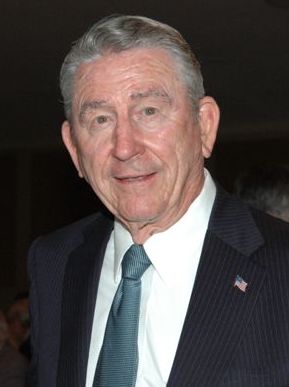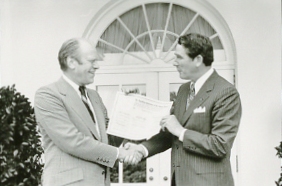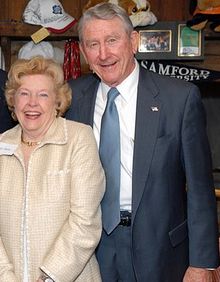Winfield Dunn facts for kids
Quick facts for kids
Winfield Dunn
|
|
|---|---|
 |
|
| 43rd Governor of Tennessee | |
| In office January 16, 1971 – January 18, 1975 |
|
| Lieutenant | John Wilder |
| Preceded by | Buford Ellington |
| Succeeded by | Ray Blanton |
| Personal details | |
| Born |
Bryant Winfield Culberson Dunn
July 1, 1927 Meridian, Mississippi, U.S. |
| Died | September 28, 2024 (aged 97) |
| Political party | Republican |
| Spouse |
Betty Prichard
(m. 1950) |
| Children | 3 |
| Parent |
|
| Education | University of Mississippi (BBA) University of Tennessee, Memphis (DDS) |
| Occupation | Dentist |
| Military service | |
| Allegiance | |
| Branch/service | |
| Years of service | 1944–1946 |
| Battles/wars | World War II |
Bryant Winfield Culberson Dunn (born July 1, 1927 – died September 28, 2024) was an American businessman and politician. He served as the 43rd governor of Tennessee from 1971 to 1975. He was the first Republican governor in Tennessee in 50 years. Dunn tried to become governor again in 1986 but lost to Democrat Ned McWherter. He stayed active in the Republican Party and the medical field until he passed away.
Contents
Early Life and Career
Winfield Dunn was born in Meridian, Mississippi. His father, Aubert C. Dunn, was a lawyer and politician. In 1944, during World War II, Winfield joined the U.S. Navy. He worked as a medical helper, called a pharmacists' mate, in the Pacific region. Later, he also served as a reserve officer in the U.S. Air Force.
Dunn earned a business degree from the University of Mississippi in 1950. That same year, he married Betty Prichard. Her father was a dentist in Memphis. After working in insurance for a few years, Dunn decided to become a dentist himself. He got his dental degree from the University of Tennessee Medical Units in Memphis in 1955. He first worked with his father-in-law, then opened his own dental office in Memphis.
Starting in Politics
Winfield Dunn was inspired by the conservative ideas of Barry Goldwater. In 1962, Dunn ran for the Tennessee House of Representatives but did not win. He then became the leader of the Shelby County Republican Party. In this role, he helped with Goldwater's presidential campaign in 1964. Dunn was also a delegate at the 1968 Republican National Convention, where he supported Richard Nixon, who later became president.
Becoming Governor
In 1970, Winfield Dunn decided to run for governor as a Republican. He faced several other candidates for his party's nomination. Thanks to strong support from his home county of Shelby, Dunn won the Republican nomination. His opponent in the main election was John Jay Hooker, the Democratic candidate.

For 50 years before 1970, Democrats had held the governor's office in Tennessee. They had mostly controlled state politics since the end of the Reconstruction. However, many Southern Democrats were becoming unhappy with the national Democratic Party's social policies. Republicans started to gain strength in Tennessee. For example, in 1966, Republican Howard Baker Jr. won a Senate race. In 1968, Richard Nixon won the state for president, and Republicans took control of the state House of Representatives. With the help of future judge Harry W. Wellford and future governor Lamar Alexander on his campaign team, Dunn defeated Hooker in the election.
Leading the State
When Dunn became governor, he wanted to bring the state together. He offered important state jobs to both Republicans and Democrats. At first, the Democrats, who controlled the state senate and had regained control of the state house, were not always willing to work with him. The Speaker of the House, James McKinney, and Lieutenant Governor John S. Wilder sometimes tried to block Dunn's plans. However, in 1972, Ned McWherter became House Speaker and was more open to working with the Republican governor.
Despite facing opposition from Democrats, Dunn was able to achieve several things. He increased the state sales tax by a small amount (0.6%). This extra money helped him build more highways and give pay raises to state employees. He also created new government departments to improve how the state managed its economy and purchases. Dunn supported the state's approval of the 26th Amendment in 1971, which lowered the voting age to 18.
In 1973, Dunn hosted a meeting for Republican governors in Memphis. President Nixon, who was dealing with the Watergate scandal, told the governors that no more bad news from the scandal would hurt their party. However, Dunn later said he was "shocked" and "disappointed" when news came out the next day about a missing 18-and-a-half minute section from the White House tapes.
Later Years and Passing
Winfield Dunn's term as governor ended in 1975. At that time, the Constitution of Tennessee did not allow governors to serve two terms in a row. After leaving office, he worked in the private sector for several years. He was a vice president for a healthcare company called Hospital Corporation of America.
In 1986, Dunn ran for governor again. He easily won the Republican primary election. However, his campaign faced challenges because of disagreements within the Republican Party. During his first term, Dunn had stopped a bill that would have created a medical school at East Tennessee State University. He believed the state already had enough medical schools. Even though the state legislature eventually passed the bill despite his veto, this decision angered powerful Congressman Jimmy Quillen. Quillen was still upset about the veto more than ten years later and did not support Dunn in the 1986 election. Without Quillen's support, Dunn struggled in East Tennessee, which was usually a strong area for Republicans. He lost the general election to the Democratic candidate, Ned McWherter.
After the 1986 campaign, Dunn focused on business and charity work. He served as chairman of Medshares, a company based in Memphis. He was also on the boards of other healthcare companies. Dunn was active in the Tennessee-Tombigbee Waterway Development Authority and supported various charities. These included the American Cancer Society, the Nashville Heart Association, and the United Way.
Dunn remained an important figure in the state Republican Party. He led the state committee for George H. W. Bush's presidential campaign in 1988. He also served as an elector for George W. Bush in 2004 and John McCain in 2008. In 2011, he supported Mitt Romney for president. Romney said that Dunn was "highly regarded for his love of country and his public service."
Winfield Dunn passed away on September 28, 2024, at the age of 97.
Family and Lasting Impact
Winfield Dunn married Betty Prichard in 1950. They had three children: Charles (Chuck), Gayle, and Julie. Winfield's father, Aubert, also served one term in the U.S. House of Representatives.
Several places in Tennessee are named in honor of Governor Dunn. The Winfield Dunn Center at Austin Peay State University is an indoor sports facility built during his time as governor. Two state roads are named after him: Winfield Dunn Parkway, part of State Highway 66, and a section of Interstate 269/Tennessee State Route 385. Buildings at Tennessee Technological University and the University of Memphis are also named for Dunn. The Dunn Dental Building, which houses the University of Tennessee College of Dentistry in Memphis, is named after him. The golf course at Pickwick Landing State Park is also named for the former governor. A statue honoring him is in the lobby of the Dunn Dental Building.
See also
 | James Van Der Zee |
 | Alma Thomas |
 | Ellis Wilson |
 | Margaret Taylor-Burroughs |


